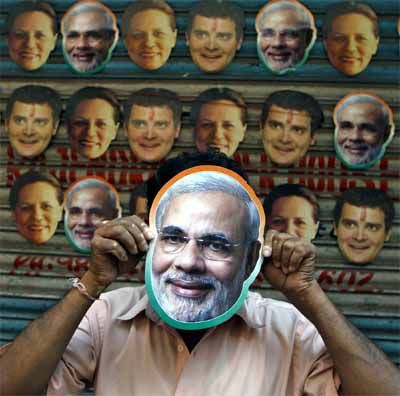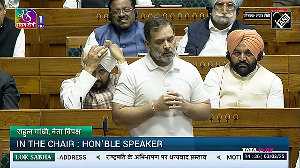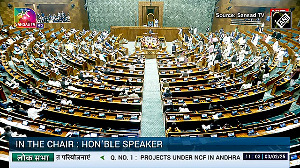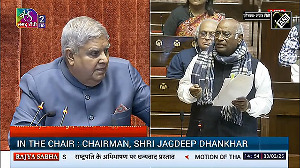
'Modi knows he will fail if he does not afford Muslims, Christians or even other backward Hindu classes the opportunities and means to improve the quality of their lives. Prosperous and educated people are less prone to rioting,' says Maneck Davar.
Twelve years have passed, yet Godhra and its aftermath are used to frighten the minority community. The embers of their insecurity have been stoked by all those political parties hoping to secure the minority vote at the hustings.
The fact that Narendra Modi, in his campaign, has hardly resorted to communal rhetoric and has relied mostly on the plank of development and growth, has failed to assuage this fear.
Fear, of course, is irrational, and can only be driven away by a rational appraisal of facts and ground realities.
Narendra Modi's ambition is not to become prime minister of this country for a day, but for at least two terms if not more.
If he does not come close to a majority and has to seek the support of rapacious allies who will bargain for infrastructure ministries to milk them, he will accelerate growth, spread the influence of the party in the east and south and call for mid-term elections.
This scenario, however, is predicated on one factor; he must deliver on his promise of development.
Modi has pitched his campaign rhetoric high. He has offered a vision, especially to the younger voter, of programmes and policies which will foster 9 to 10 per cent growth and create millions of jobs.
If he wins, and that seems likely with the heavy voting witnessed in the first few rounds, it will be because people have bought into this vision.
Modi has created huge hope and aspirations and any failure to deliver on these heightened expectations will be catastrophic for his personal ambitions.
Overall economic growth in all sectors and all parts of the country can only be achieved if there is little social tension and if all people are provided platforms and opportunities to grow.
Growth will be depleted if there is widespread social and religious unrest leading to loss of property, unproductive mandates and negative international publicity leading to a flight of foreign investment.
Optimum growth cannot be possible if a substantial section of the population, say 15 to 20 per cent, continues to be backward and deprived when it comes to education, vocational and other skills and opportunities to earn livelihoods.
Thus, Modi knows he will fail if he does not afford Muslims, Christians or even other backward Hindu classes the opportunities and means to improve the quality of their lives.
An improvement in education levels, basic infrastructure such as housing and equal employment opportunities will defuse tensions. Prosperous and educated people are less prone to rioting.
Modi's Gujarat experience is illuminating.
The last two state elections were fought on the mandate of development and not communal vote bank politics. He has often said that a motorable road is for all to use regardless of religious persuasion.
One of the five points in his present agenda for governance, which finds pride of place in the BJP manifesto, is the only way of government should be Sabka Saath, Sabka Vikaas (progress for all, with the cooperation for all).
Conversely, the demand for the Ram Janambhoomi finds a cursory mention in the manifesto, that too with the rider that this be achieved through Constitutional means.
The distrust of the minority community towards Modi, fuelled by years of relentless focus and propaganda on Gujarat 2002, may not dissipate easily, but the fear of widespread violence or discrimination is unfounded.
In the 12 years since Godhra, Gujarat -- which was perennially plagued by communal strife for decades before -- has not witnessed a single major incident of sectarian violence.
Contrast this with Maharashtra where 1,900 lives have been lost in communal clashes in the last decade.
Maneck Davar is the proprietor of Spenta Multimedia, a publishing house and a Web-based agency that creates corporate Web sites.
Photograph: Babu/ Reuters











 © 2025
© 2025